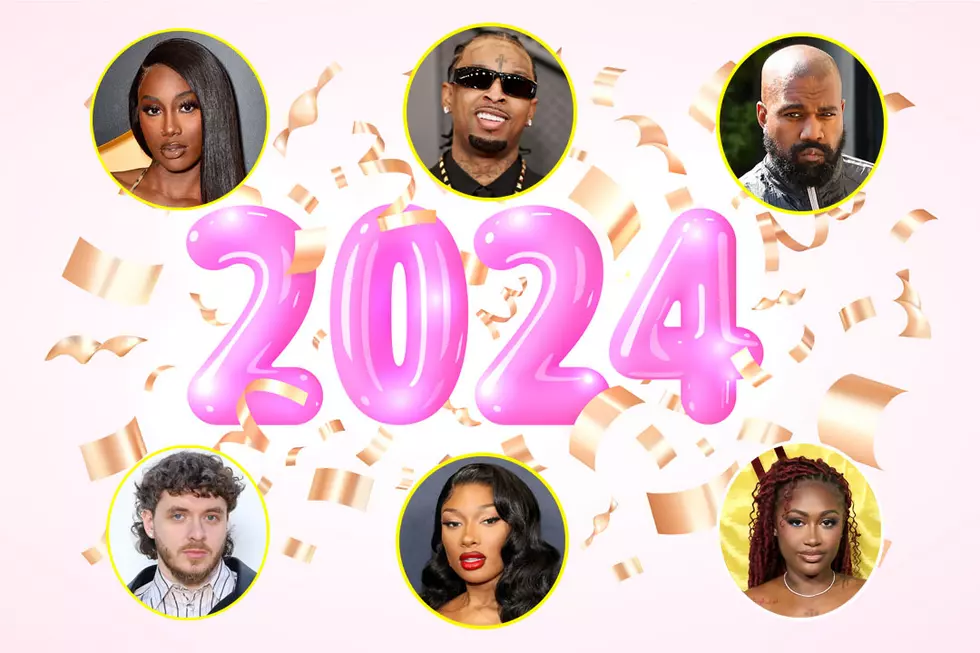
Pioneering Palestinian Rappers DAM Drop Second Album
More than 30 years since its birth in the South Bronx, hip hop has become a truly worldwide movement—and Palestine is no exception. The first and most recognized Palestinian hip-hop group is known as DAM, which means “eternity” in Arabic and “blood” in Hebrew, and also is an acronym for “Da Arabian MCs.” DAM recently finished their second full-length album, Dabke on the Moon, but told XXL that because of the current situation in Palestine—even before Israel’s recent bombing of Gaza, movement of goods across the border was (and still is) severely restricted—they have thus far only been able to release it at www.damrap.com.
Earlier this month, DAM dropped the first single from Dabke, “If I Could Go Back in Time.” The track has already won serious international praise for drawing attention to the brutal realities of “honor killing.” Rapped in Arabic, the verses tell the story of a young woman murdered by her family for refusing an arranged marriage. Reminiscent of Nas’ “Rewind,” the track and video—produced in collaboration with U.N. Women (also known as The United Nations Entity for Gender Equality and the Empowerment of Women)—depict the subject’s life story in reverse. The track is right in line with DAM’s reputation for using rap to protest all shades of oppression, whether it's sexism, racism or the Israeli occupation.
The group was created in 1999 by brothers Tamer and Suhell Nafar and their friend Mahmood Jrere. The three MCs grew up in Lydd, a mixed Palestinian-Jewish town near Jerusalem. Typically deeply segregated, the Palestinian neighborhoods in cities like Lydd often suffer from disproportionately high poverty and crime rates. It was in this environment of struggle that Tamer discovered hip-hop as a teenager in 1996, teaching himself English by studying Tupac lyrics.
The group won widespread international acclaim in 2001 with the single “Min Irhabi” (which translates to “Who’s the Terrorist?”), and their first album, Dedication, was released in 2006. Mahmood Jrere and Tamer Nafar recently sat down with XXL over Skype to discuss the often-controversial history of DAM and the message of their new work. —Katie Moore
XXL: What can you tell us about your new single “If I Could Go Back in Time”?
Tamer Nafar: Normally hip-hop is known as chauvinistic, and the Arab world has a history of oppressing its women. We are Arab rappers doing a song against honor killing.
XXL: You rap mostly in Arabic on the new album, but one song is in English.
Nafar: Yeah, it’s a love song, a sarcastic love song. It’s called “I’m in Love With a Jew.” It’s a metaphor for the situation. I get stuck in the elevator with this beautiful woman, she’s Jewish, and we start to talk. It’s the same thing—we’re both stuck here in this situation, like an elevator, and the only difference between us is that, in the elevator, she’s pressing the up button and I’m going down.
XXL: Your last full album was 2006. What are the biggest musical changes between that project and this one?
Nafar: Musically, we worked with different producers. When we did Dedication, our knowledge of music was strictly hip-hop. The last five years, we went to pop, Arab music, rock ‘n’ roll, world music, reggae music. This time the music limited the length of the verses. With the first album, it was 16, hook, 16, hook, 16, hook. And now in certain songs, according to the vocals, you only have 8 bars. So it was challenging for us to deliver the message, it takes more working on it, more effort. Of course sometimes we were more hip-hop and we said, “I want to have 24 bars here and that’s it.” So it worked different for different people. [Dabke] is a feature. You know when you finish cinema [school], you do a documentary and then a few years later you do your first feature? So, our first album is a documentary and the second one is a feature.
READ ON TO FIND OUT ABOUT DAM'S NEW ALBUM DABKE!
Mahmood Jrere: Lyrically, each artist is changing from year to year. Each artist is changing his mind, and when the mind and thoughts are changed, so the lyrics are changed. And this is happening with DAM. The whole development of DAM is 12 years. I would say that the biggest change and difference between Dedication and Dabke on the Moon is that now we are telling stories. In Dedication, we were describing situations—there is this, there is that. Now we describe the situation but through stories, through stories of people. One example of it is the song on honor killings and women’s rights, and another one is about the Palestinian prisons. We read books on it and personal letters, we read everything and then we told the stories from our point of view, DAM’s point of view. I think this is the major difference in the aspect of lyrics.
XXL: You were fundraising online for the new album. Can you tell us a little about that?
Nafar: It’s not exactly raising funds, it’s presales. First of all, the difference between us and the U.S. and the rest of the world is that here there is no industry, there’s no official market. There’s no Def Jam, there’s no Sony, there’s nothing here. It’s not our country. They have record companies for Israelis. There is no place for Arabs here. We do the album, and people always end up burning it and downloading it. So this time, we put it out the street way. First you pay us, then we deliver the album. So now if it’s getting stolen I don’t mind, because it’s already paid for.
Jrere: This is how to truly live the term “power to the people.” You make your art for your people, not for corporations and labels where you get nothing out of it. So it’s a trade between us and between our friends, where they support our art and we send them an album or a poster or whatever they made a donation for. So I think it’s a fair trade and has been very successful.
XXL: If listeners take away one thing, one lesson, from Dabke, what would you want it to be?
Nafar: I want the American people, the African-American hip-hop culture, to know that it’s reaching people all around the world. And it inspires us, but we don’t copycat it. We add more sounds to it. We add our personality and our instruments, our culture, our environment. It’s exchanging cultures. I never knew English before, and I learned it through Tupac. I learned everything about the African-American struggle by listening to Tupac’s songs, so I hope this will be a gate to our culture as well.
XXL: And how do you believe that struggle relates to your own?
Nafar: We are both minorities, and we’re not trying to say who suffers more. It’s not a competition; every place has its own story. Israel came here, so it’s different—we are the natives here, we would never call ourselves Arab-Israelis. African-Americans in the U.S., they are oppressed and they use hip-hop, and we also are oppressed and use hip-hop. We are using the same weapons.
XXL: Where do you see DAM in five years, 10 years, and beyond?
Nafar: I hope that we will be the first [artists signed to] Def Jam here.
Jrere: I hope we sell more albums. We have more and more lyrics, and we need more and more albums. As musicians, our main focus is to bring a different sound all the time, new ways of telling stories. We want to be able to deliver that and also be entertainment, have a message, and not be boring. The day that we start being boring in our albums, I guess it’s time to stop.
More From XXL









